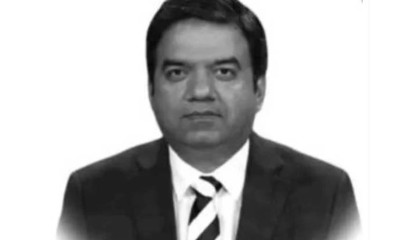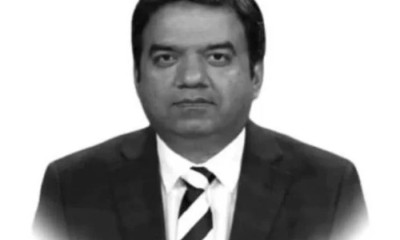Pakistan
Present regime and dengue!
A few days ago I was busy in a meeting in my office when I received a call from a friend on my phone. I didn't listen to that call due to my busy schedule and thought that I would call back after finishing the meeting, but then the same friend's call started coming again.
I hung up the phone again and texted him that I was busy with the meeting, finished and called back. As soon as I read this message, this friend of mine sent me a reply message that Imran Bhai is an emergency, so contact me immediately. As soon as I read this message, I called this friend and he almost cried and told me that my sister is very ill, her platelets are very low due to dengue and the doctors have said that if you take her life If you want to save, take the patient to a good hospital in Lahore immediately. Brother Imran! Do something for God's sake, or my sister will die. We have made every effort for ourselves. There is no bed in any government or private hospital. Help us for God's sake.
I comforted him on my own and said: "You hang up. I'll do something." As soon as I hung up, I called a very close friend of mine, a doctor who is the CEO of a well-known private hospital in Lahore, and stated my case. Expressing his helplessness, Dr Sahib said to me, "Imran bhai, you are well aware that if I have the capacity for one bed, I should be present, but what can I do?" There is no room available and no bed in the ICU. All the hospitals are full of dengue patients. After hearing this denial, I contacted the owner of another well-known hospital in Lahore, located in front of Gaddafi Stadium on Ferozepur Road, through another friend, but got a similar response from there. On the other hand, my friend was constantly crying and calling me to do something for the sake of God.
With every call of his phone, not only my responsibility was increasing but also my embarrassment was constantly increasing. It was increasingly why I could not help him in this troubled world. In the midst of this predicament, I contacted another friend of mine, a doctor who also owns a large private hospital in Lahore, and asked him for some special compassion and help in this whole situation. He was especially kind and told me that there was no room or ICU bed available but that I could do something to alleviate the anxiety of you and your friend in the side room next to the ICU. This patient is admitted and his treatment is started immediately. I especially thanked the doctor and told my friend to take his sister to the hospital immediately.
After going through all this process, I was forced to think why we Pakistanis are deprived of even basic facilities for treatment in case of any disease? Under the Constitution of Pakistan, when it is the responsibility of the government to provide health and medical care to every Pakistani, then why do we have to stumble, be humiliated and seek recommendations for treatment. Don't ask the poor, even though they have money and resources, they have to beg for treatment in private hospitals. Room rent in most private hospitals is higher than in five star hotels, but the people who are willing to spend that much money still don't get the facilities. The poor die wandering around in government hospitals seeking treatment, but no one cares.
According to the World Health Organization, Pakistan spends only 1.2% of its GDP on health, while the WHO suggests Pakistan should spend 5% of GDP on health. When Prime Minister Imran Khan was in opposition, he was openly critical of the lack of health facilities and government policies. He also claimed that after the formation of the PTI government, revolutionary steps would be taken in the field of healthcare in the country, especially at government hospitals where all the medical facilities would be available to the common man. Has this happened? If you ask the truth, the answer is no.
Per official figures released in May 2020, Rs90.1 billion were spent on the health of 111.12 million people in Punjab, the country's largest province. That is Rs818.99 per annum and Rs 68.25 per month were spent for the health of an individual. The Sindh province, which came second in terms of population, spent Rs62.5 billion on the health of its 47.8 million citizens, i.e. Rs1,305 per citizen per year and Rs108.76 per month per month. Balochistan has a population of 12.3 million and has a health budget of Rs15.2 billion, i.e. Rs1,231.32 per citizen per year and Rs102.61 per month. In 2018-19, FATA was not integrated into Khyber Pakhtunkhwa due to which KP had set aside Rs23.5 billion for its population of 35.23 million. Thus, Khyber Pakhtunkhwa spent Rs769.90 per person per year and Rs64.15 per month.
Speaking of Islamabad, the federation spent Rs12.4 billion in the health sector last financial year, which was for the citizens of the federal capital as well as for the areas under its jurisdiction. After Corona, dengue has raised more questions about the government performance. The PML-N has sharply criticized the government in this regard. Opposition leader in Punjab Hamza Shehbaz has even said the Punjab government is responsible for the spread of dengue in Punjab, which was pointed out by a report of the health department itself. This year's dengue campaign was ordered at a time when deaths were on the rise.
Whether the people trust the government or the opposition, the truth is that every Pakistani has a constitutional and fundamental right to access appropriate treatment.
Pakistan
Dar's appointment as deputy PM challenged in SHC
The former finance cizar and foreign minister was appointed deputy prime minister on April 28
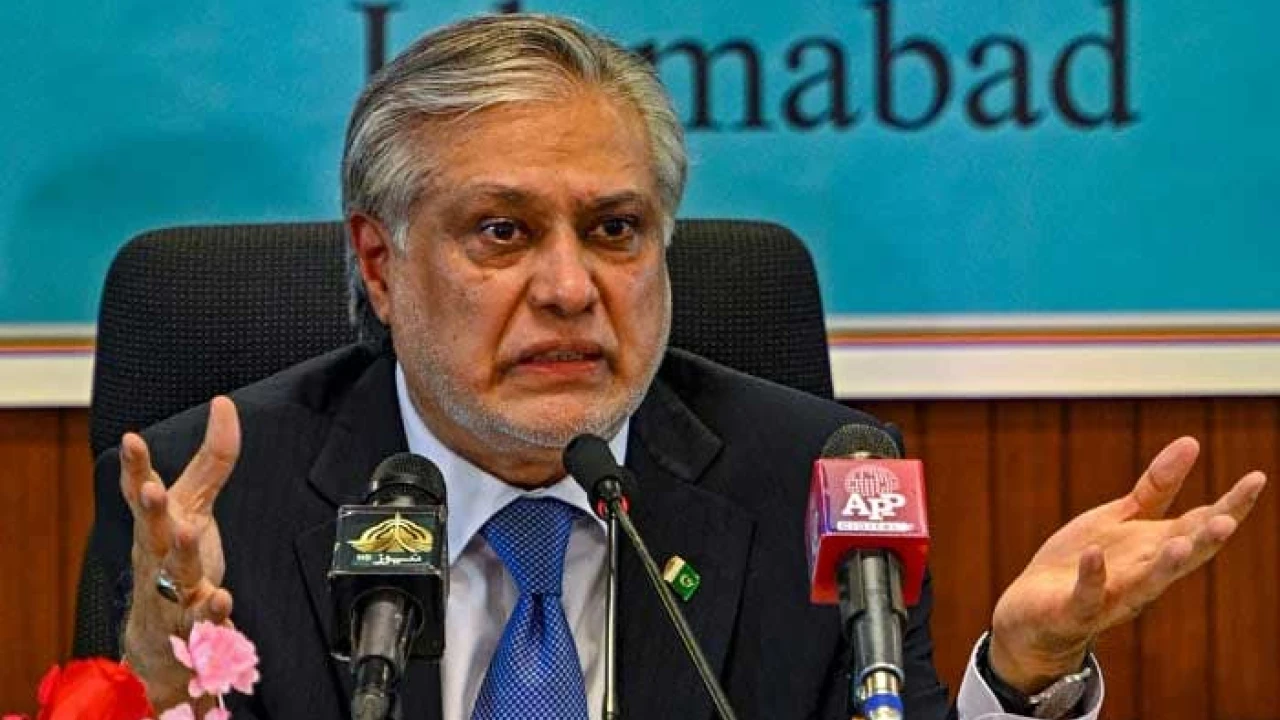
Karachi: A petition was filed in the Sindh High Court (SHC) on Thursday against the appointment of Foreign Minister Ishaq Dar as deputy Prime Minister. The petitioner challenged the notification of the appointment.
A two-member bench headed by the chief justice will hear the case. According to the petitioner, there is no provision for the position of the deputy PM in Pakistan's constitution. Dar was appointed as deputy prime minister on April 28.
The PML-N stalwart is the fourth politician to be posted as the deputy PM in the history of Pakistan as earlier PPP founder Zulfiqar Ali Bhutto, his wife Begum Nusrat Bhutto and PTI leader Chaudhry Pervez Elahi had served the portfolio.
Technology
AI could risk 17pc of jobs in Saudi Arabia: experts
Director of the Middle East affairs of a global consultancy firm, said that considering the future changing conditions, it can be said that 17% of jobs in the Kingdom will be replaced by AI within three years

Riyadh: International consultants said that Artificial Intelligence (AT) could affect 17% of jobs in Saudi Arabia in the next three years.
According to Arab media, Najla Najam, professional business manager of an American consulting business company, stated that AI is expected not only to change the way people work, but it is also possible that it will replace people.
The experts suggested that 80% of jobs related to creative work can be affected by artificial intelligence, while 53% of executive positions are at risk from AI. An increase is also expected in the manufacturing sector by 10 to 30 percent over the next three years with the help of AI.
The study revealed that employees in the Middle East are more involved in productivity issues than in other countries, but it is also expected that organizations will train their employees to adapt them to the demands of the new era.
A large number of those affected by artificial intelligence will be people from the 90s to the 21st century whose jobs may be at risk.
Oliver, director of the Middle East affairs of a global consultancy firm, said that considering the future changing conditions, it can be said that 17% of jobs in the Kingdom will be replaced by artificial intelligence within three years.
World
California police flatten pro-Palestinian camp at UCLA, detain protesters
The pre-dawn police crackdown at UCLA marked the latest flashpoint in mounting tensions on US college campuses
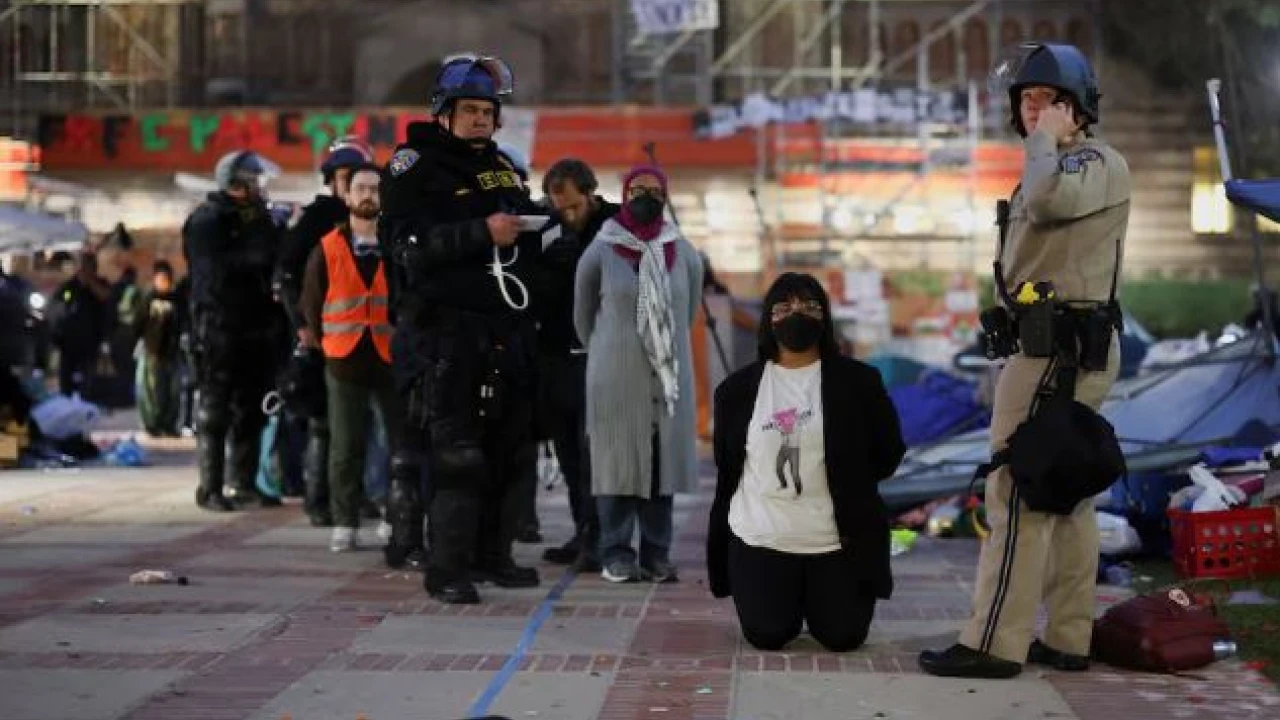
Los Angeles (Reuters): Hundreds of helmeted police swarmed the site of a pro-Palestinian protest at the University of California at Los Angeles early on Thursday, firing flash bangs, arresting defiant demonstrators and dismantling their encampment.
The pre-dawn police crackdown at UCLA marked the latest flashpoint in mounting tensions on U.S. college campuses, where protests over Israel's war in Gaza have led to student clashes with each other and with law enforcement.
"I'm a student here. I'm an English major," one student said to television cameras, as police dragged him away. "Please don't fail us. Don't fail us."
Prior to moving in, police urged demonstrators in repeated loudspeaker announcements to clear the protest zone, which occupied a central plaza about the size of a football field.
After massing around the campus for hours, officers eventually moved through the area in lines holding batons as protesters - some in white helmets - linked arms, attempting to block their advance.
Live TV footage showed officers taking down tents, tearing apart barricades and removing the encampment, while arrested protesters sat with their hands restrained behind their backs with zip-ties.
Students have rallied or set up tent encampments at dozens of schools in recent days, calling for an immediate ceasefire in Gaza and demanding schools divest from companies that support Israel's government. Many of the schools, including Columbia University in New York City, have called in police to quell the protests.
CAMPUS CLASHES
At UCLA, dozens of loud explosions were heard during the clash from flash bangs, or stun grenades, fired by police as the moved into the camp in the early morning hours.
Demonstrators, some carrying makeshift shields and umbrellas, sought to block the officers' advance by sheer numbers, while chanting "push them back" and flashing bright lights in the eyes of the police.
Others on the opposite side of the camp gave up quickly, and were seen walking away with their hands over their heads under police escort.
Local television station KABC-TV estimated 300 to 500 protesters had been hunkered down inside the camp, many wearing the traditional Palestinian keffiyeh scarves, while around 2,000 more had gathered outside the barricades in support.
Those numbers dwindled on Thursday as protesters left the camp and were arrested.
Some of the protesters had been seen donning hard hats, goggles and respirator masks in anticipation of the siege a day after the university declared the encampment unlawful.
By sunrise, the plaza was strewn with detritus from the destroyed encampment: tents, blankets, food containers, a Palestinian flag, an upturned helmet. A line of officers carrying batons stood at the plaza's edge, while a small group of remaining protesters shouted chants at them nearby.
The protests follow the deadly Oct. 7 attack on southern Israel by Hamas militants from the Gaza Strip, which killed 1,200 people and saw dozens taken hostage, and an ensuing Israeli offensive that has killed about 34,000 and created a humanitarian crisis.
Protesters have called on President Joe Biden, who has steadfastly supported Israel's right to defend itself, to do more to stop the bloodshed and ease the humanitarian crisis.
The campus demonstrations have been met with counter-protesters accusing them of fomenting anti-Jewish hatred. The pro-Palestinian side, including some Jews opposed to Israeli actions in Gaza, say they are being unfairly branded as antisemitic for criticizing Israel's government and expressing support for human rights.
The issue has taken on political overtones in the run-up to the U.S. presidential election in November, with Republicans accusing some university administrators of turning a blind eye to antisemitism.
-
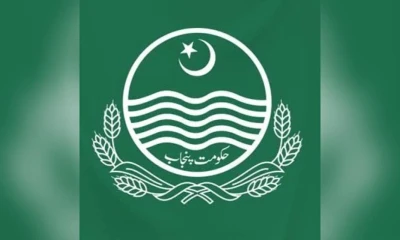
 Regional 2 days ago
Regional 2 days agoPunjab govt makes transfer, posting of senior officers
-

 Sports 13 hours ago
Sports 13 hours agoPakistani squad for Ireland, England series announced
-
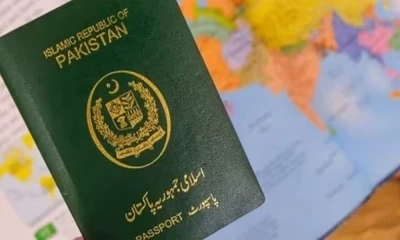
 Pakistan 8 hours ago
Pakistan 8 hours agoGovt releases funds to end current passport backlog
-
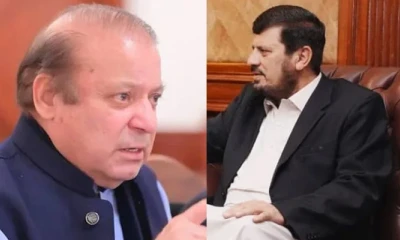
 Pakistan 1 day ago
Pakistan 1 day agoGovernor KP Ghulam Ali meets Nawaz Sharif
-
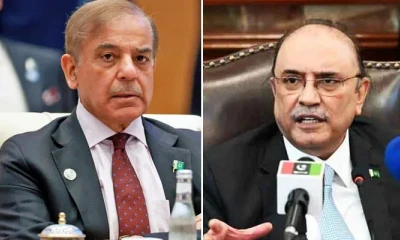
 Pakistan 1 day ago
Pakistan 1 day agoPM Shehbaz, Zardari pays tribute on Labour Day
-
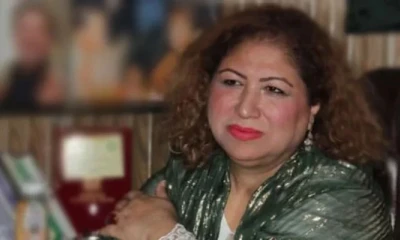
 Pakistan 1 day ago
Pakistan 1 day agoIPP gets another shock
-

 Sports 2 days ago
Sports 2 days agoEngland announce squad for series against Pakistan
-
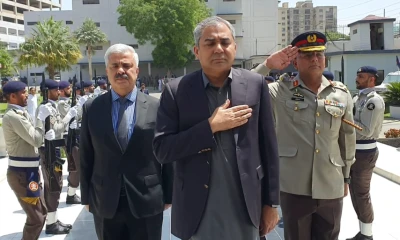
 Pakistan 1 day ago
Pakistan 1 day agoInterior Minister visits Pakistan Coast Guards’ headquarters


